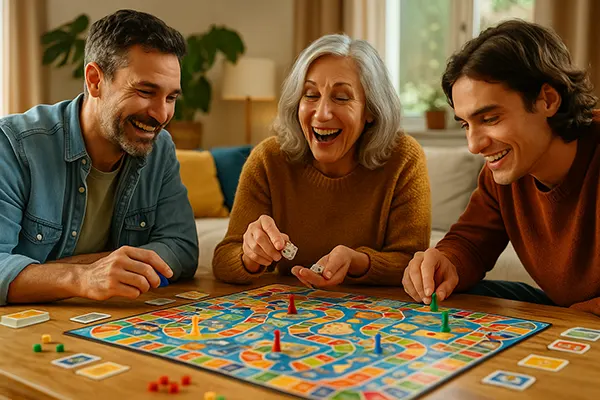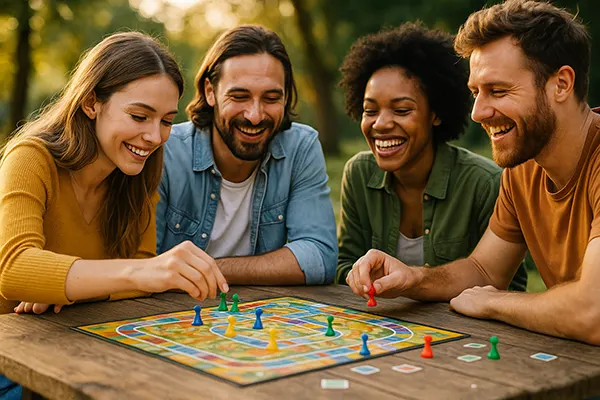
In recent years, board games have regained popularity not only as a source of leisure but also as a tool for improving mental well-being. Psychologists, neuroscientists, and wellness experts confirm that these games can play a vital role in enhancing cognitive functions and reducing anxiety. Mindful gaming encourages meaningful social interactions, trains the brain, and offers a healthy alternative to screen-based activities.
The Cognitive Power of Board Games
Board games are powerful tools for cognitive stimulation. They engage memory, concentration, and strategic thinking — skills essential for maintaining a sharp mind. Games like chess, Scrabble, and Codenames require players to plan ahead, recall information, and evaluate multiple possibilities, which strengthens neural connections and promotes long-term brain health.
Studies from 2023–2025 show that people who regularly engage in board games demonstrate better problem-solving abilities and improved memory retention. The act of strategising activates both hemispheres of the brain, supporting balanced cognitive development and delaying cognitive decline in older adults.
Moreover, mindful play demands focus on the present moment, which is key to maintaining cognitive flexibility. Unlike passive activities, board games require active participation, keeping the brain constantly alert and engaged.
Enhancing Creativity and Learning
Many board games promote creativity and innovative thinking. Games like Dixit or Pictionary stimulate imagination by challenging players to express abstract ideas visually or verbally. Such activities enhance not only linguistic and artistic abilities but also emotional intelligence, as players learn to interpret subtle cues and perspectives.
For children and teenagers, educational board games provide an engaging way to acquire new knowledge and skills. They encourage logical reasoning, teamwork, and perseverance. For adults, these games offer an opportunity to rediscover curiosity and the joy of learning without pressure or competition.
When played regularly, creative and educational board games can help develop adaptability — a skill increasingly valued in both professional and personal life in 2025’s fast-paced world.
Reducing Stress Through Mindful Play
Modern life is filled with stressors, from constant connectivity to growing work demands. Board games offer an effective antidote to this pressure by creating an atmosphere of relaxation and shared enjoyment. During play, people experience the therapeutic benefits of laughter, conversation, and collaboration.
Mindful gaming encourages players to disconnect from digital devices and focus on real human connections. This social engagement triggers the release of oxytocin — the “bonding hormone” — which reduces cortisol levels and lowers stress. Even short gaming sessions can provide measurable benefits for mental and emotional well-being.
Furthermore, the structured nature of board games provides a sense of control and predictability. In uncertain times, such activities can serve as grounding rituals, helping individuals feel secure and emotionally balanced.
Mindfulness in Group Interaction
Playing board games with friends or family cultivates mindfulness through cooperation and empathy. The act of taking turns, listening actively, and respecting different viewpoints reinforces patience and social awareness — qualities essential for emotional intelligence.
Regular participation in group gaming sessions has been shown to improve communication and reduce symptoms of loneliness. For older adults, especially those living alone, such interactions can be crucial in maintaining psychological resilience and reducing feelings of isolation.
In workplaces, team-building through board games fosters trust and strengthens group dynamics. It’s a mindful practice that improves not only morale but also overall productivity by reducing stress-related burnout.

Integrating Mindful Games into Everyday Life
Incorporating board games into daily routines doesn’t require significant effort. Families can schedule weekly game nights, while workplaces may introduce “mindful breaks” featuring short, engaging games. Such routines help maintain emotional balance and mental sharpness over time.
Health professionals increasingly recommend board games as part of holistic mental wellness programmes. In rehabilitation and elderly care, cognitive-based games are used to enhance memory, fine motor skills, and coordination, offering patients a positive and stimulating experience.
For individuals seeking mindfulness, solo puzzle-based games — such as Sudoku or solo variants of classic board games — can provide a meditative experience. These activities promote calm focus and allow the mind to rest while staying engaged.
The Future of Mindful Entertainment
As society becomes more aware of mental health’s importance, mindful entertainment will continue to grow. The resurgence of board games reflects a collective desire to slow down, connect authentically, and nurture the mind through play. This movement aligns with the growing trend of “digital detox” and conscious living.
By combining mindfulness with social interaction and cognitive challenge, board games redefine relaxation for the modern age. They provide not just amusement but meaningful engagement that enhances well-being on multiple levels — mental, emotional, and social.
Ultimately, mindful play reminds us that true joy and mental clarity come not from speed or competition, but from presence, connection, and shared laughter around the table.